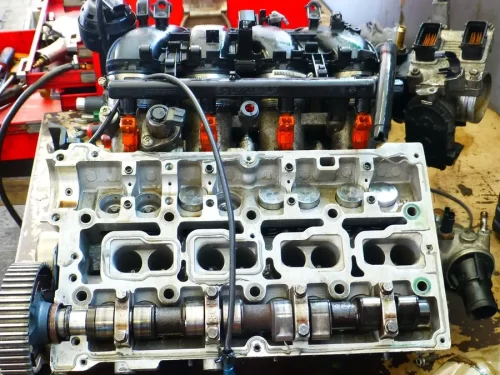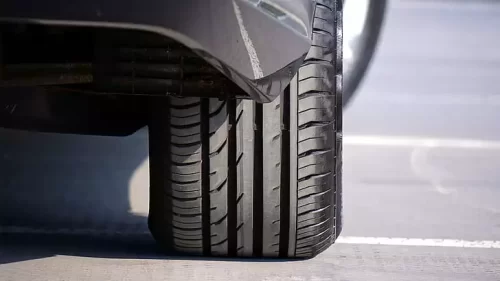
FAST FACTS Vol. 1, Issue 48 – A Christmas Story
Whee Anything That Could Go Wrong, Does… perfectly! This classic holiday movie features a 1937 Oldsmobile F-37 Six Touring Sedan. If you are not familiar


Your Ford Ranger is more than just a vehicle. It’s a companion for both the everyday city drive and the adventurous off-road excursion. To keep this faithful engine running smoothly, there’s one golden rule that every Ford Ranger owner should abide by—regular maintenance.
Related Article: Tips for Maximizing Fuel Economy In A Ford
Fraser Ford Ranger Engine Options:
So buckle up, and let’s dive into the journey of keeping your Ford Ranger engine running smoothly.
Ford’s Automatic Engine Shutdown is a feature that is designed to make drivers conserve fuel and reduce emissions. When your vehicle is idling for an extended period of time, the system automatically shuts down the engine. The engine can be restarted immediately by pressing the accelerator pedal, ensuring you can continue your journey without delay. This feature is particularly useful in stop-and-go traffic or long waiting times at traffic lights.
Starting a Ford gasoline engine involves turning the ignition to the ‘Start’ position without pressing the accelerator pedal. In modern Ford vehicles, you may have a push-button start in which case you would push the button while holding down the brake pedal. The engine should start up immediately. If the engine does not start within 5 seconds, wait for 10 seconds before trying again to avoid flooding the engine.
Engine idling, or leaving your car running while it’s stationary, can be harmful to the environment. It contributes to air pollution and greenhouse gas emissions. With Ford’s Automatic Engine Shutdown feature, these negative impacts can be mitigated.
Besides being harmful to the environment, engine idling also leads to unnecessary fuel consumption. You may think that your car isn’t using much fuel when it’s idling, but an idling engine can consume a significant amount of fuel over time. With the Automatic Engine Shutdown feature, you can save on fuel costs.
Conducting regular oil changes is a critical component of your Ford Ranger’s preventative maintenance schedule. Oil is the lifeblood of your engine, performing several key roles that are integral to its smooth operation and longevity. Firstly, the oil serves as a lubricant for the moving parts of your vehicle’s engine. By reducing friction between these components, it prevents excessive wear and tear. This, in turn, reduces the risk of premature engine failure and costly repair or replacement.  Secondly, oil acts as a coolant for the engine. While most of us are familiar with the radiator’s role in cooling the engine, it’s less commonly known that oil shares this responsibility. By circulating through the engine, the oil helps to disperse heat and maintain an optimal operating temperature. Thirdly, oil acts as a cleaning agent. As it circulates, it picks up dust, dirt, and other forms of debris that have made their way into the engine. Over time, these impurities are filtered out when the oil passes through the oil filter. This process also helps to prevent the build-up of sludge that can hinder engine performance. Lastly, the oil aids in sealing the gap between the piston rings and the cylinder wall, allowing for effective compression within the combustion chamber and preventing power loss. Regular oil changes ensure that the oil can continue to effectively perform these functions. Over time, heat and contamination can cause the oil to break down, reducing its viscosity and effectiveness as a lubricant and cleaner. Regularly replacing old, degraded oil with fresh, high-quality oil ensures the continued health and efficiency of your engine.
Secondly, oil acts as a coolant for the engine. While most of us are familiar with the radiator’s role in cooling the engine, it’s less commonly known that oil shares this responsibility. By circulating through the engine, the oil helps to disperse heat and maintain an optimal operating temperature. Thirdly, oil acts as a cleaning agent. As it circulates, it picks up dust, dirt, and other forms of debris that have made their way into the engine. Over time, these impurities are filtered out when the oil passes through the oil filter. This process also helps to prevent the build-up of sludge that can hinder engine performance. Lastly, the oil aids in sealing the gap between the piston rings and the cylinder wall, allowing for effective compression within the combustion chamber and preventing power loss. Regular oil changes ensure that the oil can continue to effectively perform these functions. Over time, heat and contamination can cause the oil to break down, reducing its viscosity and effectiveness as a lubricant and cleaner. Regularly replacing old, degraded oil with fresh, high-quality oil ensures the continued health and efficiency of your engine.
Reducing engine idling is a critical step towards conserving fuel, reducing emissions, and improving the longevity of your vehicle. Here are five in-depth solutions that can help in achieving these goals:
If your vehicle is equipped with an automatic engine shutdown system, make full use of this feature. It’s designed to automatically turn off the engine during prolonged periods of inactivity and restart it when you’re ready to move. This not only saves fuel but also minimizes wear and tear on the engine.
If your vehicle doesn’t have an automatic engine shutdown system, develop the habit of manually turning off the engine when you anticipate being idle for more than a minute. Although it may seem inconvenient at first, the fuel savings and reduced emissions will soon make this a worthwhile habit.
Hybrid and electric vehicles have the distinct advantage of using no fuel or producing no emissions when idle. Hybrids can switch to electric mode during idle periods, and electric vehicles consume very little power when stationary. While this involves a larger upfront investment, the fuel savings and environmental benefits over time are significant.
Plan your trips to avoid peak traffic hours and high-congestion areas where possible. Using apps that predict traffic conditions can help you choose the most efficient routes and reduce idle time in traffic.
By sharing rides or using public transportation, fewer vehicles are on the road, reducing overall traffic congestion and thus, engine idling. Furthermore, many public transit vehicles are moving towards hybrid or electric models, using battery power and further reducing the environmental impact.
Regular oil changes are a crucial part of vehicle maintenance. However, if these aren’t kept up, it can lead to several detrimental effects on your Ford Ranger’s engine, performance, and longevity. Here’s a more detailed breakdown of the potential issues:
Firstly, the oil serves as a lubricant for the moving parts of your vehicle’s engine. By reducing friction between these components, it p
Fresh oil provides vital lubrication to the many moving parts in your engine. Over time, oil degrades and loses its ability to lubricate effectively. This can lead to increased friction between engine components, causing excessive wear and potentially severe engine damage. Neglecting oil changes can eventually result in costly repairs or even complete engine replacement. 
Old, degraded oil can turn into sludge — a thick, dark substance that can clog your engine. This sludge can inhibit oil flow, preventing it from properly lubricating and cooling engine components, which may result in overheating and a decline in overall engine performance.
Clean oil contributes to optimal engine performance, which includes fuel efficiency. Without regular oil changes, the oil’s viscosity can change, and it can become contaminated. These factors can lower your engine’s efficiency, resulting in poor fuel economy. Over time, this can lead to increased fuel costs.
Old, dirty oil can lead to increased exhaust emissions. This not only harms the environment, but it could also cause your vehicle to fail its emissions test, depending on your local regulations.
Without regular oil changes, your Ford Ranger’s overall performance can be impacted. You might notice a lack of power, rough running, or strange engine noises. In some cases, the engine might even fail to start.
By neglecting regular oil changes, you risk shortening the lifespan of your engine. Old oil simply can’t protect your engine as well as new oil can. Regular oil changes are an investment in the long-term health and longevity of your Ford Ranger’s engine.
Here are several signs indicating that your Ford Ranger may need an oil change sooner than expected: Change Oil Light or Check Engine Light Illuminates: The most direct sign that your vehicle requires an oil change is when the “Change Oil” or “Check Engine” light on your dashboard comes on. Modern vehicles have systems that monitor the quality of your oil and alert you when it’s time for a change. Dark, Dirty Oil: Fresh oil has a clear, amber color. Over time, as the oil collects particles from the engine, it becomes darker and thicker. You can check the color of your oil by removing the dipstick, wiping it clean, reinserting it, and then pulling it out again to see the color. If the oil is dark and dirty, it’s likely time for an oil change. Knocking or Rumbling Engine Noise: Oil provides lubrication to the moving parts of your engine and transmission. When the oil is old or low, these parts may begin to grind against each other, causing unusual noises. If you hear a knocking, rumbling, or rattling sound, it’s advisable to check your oil and potentially get an oil change. Oil Smell Inside the Vehicle: If you start smelling oil inside your car, it could indicate a serious problem, like an oil leak. If the smell is accompanied by the scent of gas or exhaust fumes, your vehicle could be at risk of overheating and needs to be checked immediately. Excessive Mileage: If you’ve driven a significant distance since your last oil change, especially in harsh driving conditions, your vehicle may need an oil change even if you’re not experiencing any other signs. Always refer to your vehicle’s owner’s manual for mileage recommendations. Excessive Exhaust Smoke: While it’s normal for some exhaust to come out of your tailpipe, if you notice more smoke than usual, this could be a sign that you have an oil leak or it’s time for an oil change. Lower Fuel Efficiency: If you notice that you have to fill up your tank more often than usual, this could be a sign that your engine oil needs to be replaced. Old or dirty oil can make your engine work harder, thus reducing its fuel efficiency.
As a rule of thumb, it’s advisable to check your oil level at least once a month. This regular check can help you spot potential issues such as leaks or excessive oil consumption, which might indicate a problem within your engine. It’s also wise to check your oil before embarking on a long journey to ensure your engine is well-lubricated for the trip.
The best oil for your Ford Ranger depends on the model and the driving conditions. However, Ford generally recommends using a high-quality synthetic blend oil that meets their specifications, as stated in the owner’s manual.
To save money and minimize the cost of oil changes, consider purchasing oil and filters in bulk or during sales, learn how to change the oil yourself, or find a reputable service center that offers oil change packages or loyalty discounts. Remember, while cost-saving is important, using quality oil and filters is crucial for the longevity and performance of your engine. 
Typically, the best place to start when choosing an oil filter is your Ford Ranger’s owner’s manual. This will often specify the type of filter needed for your specific vehicle model and engine type. Using this information ensures compatibility and optimum performance. However, if you need additional guidance, consider the following types of oil filters commonly used in vehicles: Spin-On Oil Filters: These are the most common type of oil filters used in vehicles today, including the Ford Ranger. They are easy to install and remove, making them a popular choice for many vehicle owners and mechanics. Cartridge or Canister Oil Filters: These types of filters require a little more work to change as you have to replace the filter media and then reinstall the canister, but they are considered environmentally friendly because only the internal filter cartridge needs to be replaced. While choosing between these types largely depends on your vehicle’s specifications, there are also different brands and quality levels to consider. Economy Oil Filters: These filters are often made with lower-quality materials and are designed for basic protection for standard oil change intervals. They’re usually the least expensive option, but they may not provide the level of filtration higher-end options do. Premium Oil Filters: These filters are built with higher-quality materials and advanced filtration technology. They’re designed to handle synthetic oils and extended oil change intervals. They’re more expensive, but they typically provide better engine protection. Some well-regarded brands in the industry include Ford Motorcraft (which is Ford’s own parts brand), Fram, Bosch, K&N, and Mobil 1. Each of these brands offers different levels of filters to suit various needs.
 What is the most important thing to consider when performing an oil change on my Ford Ranger?
What is the most important thing to consider when performing an oil change on my Ford Ranger?The most important thing to consider when performing an oil change on your 2.3l Ford engine is to use the correct type and amount of oil, as well as a quality oil filter. Proper disposal of old oil is also crucial, both for environmental considerations and legal reasons. Always refer to your vehicle’s owner’s manual for specific instructions and recommendations.
Failure to regularly change the oil in your Ford Ranger can lead to a buildup of sludge and debris, increased engine wear due to poor lubrication, decreased fuel efficiency, and potential engine failure. Regular oil changes are a small investment that can save you from costly repairs in the future.
Synthetic oil offers several benefits over traditional motor oil. It provides superior engine protection, especially under extreme weather conditions and heavy loads. It also improves engine performance, enhances fuel efficiency, and extends the interval between oil changes. However, it’s important to consult your owner’s manual or a professional to confirm whether synthetic oil is suitable for your particular model of Ford Ranger.

Whee Anything That Could Go Wrong, Does… perfectly! This classic holiday movie features a 1937 Oldsmobile F-37 Six Touring Sedan. If you are not familiar

In this issue, we learn about the long history about Herbie, The Love Bug. Herbie, The Love Bug, that famous VW Beetle, spans a cinematic lifetime

Issue 25 • Engine & Transmission Tips Watch for these signs your tires are nearing their end of life There isn’t a lot of mystery

Demolition derbies. A heart-pounding competition of twisted metal, roaring engines, and plumes of smoke, where scrap heaps transform into chrome gladiators. But beyond the pyrotechnics

Ford Motor Company has the powerful workhorse 6.8L V10 engine, found in a wide range of vehicles from Super Duty trucks to RVs. It’s renowned

Issue 33 • Engine & Transmission Tips Fall is here! Make sure you’re ready for a bad-weather driving experience October is just around the corner